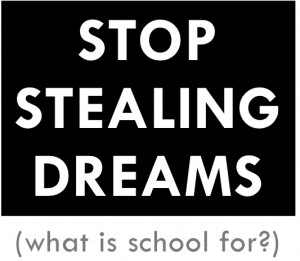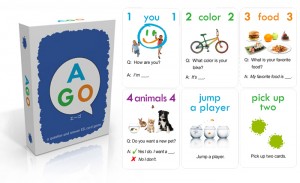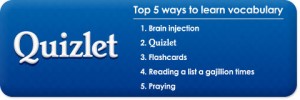blogging curriculum EFL evaluation expectations Language learning teaching testing theory
by sendaiben
leave a comment
Are we stealing dreams?
Seth Godin, who is an internet/new media/publishing/idea guru, just published a manifesto aimed at starting (or continuing) a conversation about the future of education. Very much in the same vein as Ken Robinson’s famous TED talk on the same subject, Stop Stealing Dreams (what is school for?) is a 30,000 word ebook that is currently available for free. Based on his previous work, it’s probably worth your time.
apple curriculum EFL language courses Language learning online resources technology textbooks
by sendaiben
5 comments
Apple Education
Reading about the new Apple educational push, I was pretty impressed. It seems like they ‘get’ the core issues:
1. textbooks need to be interactive and appealing, and take advantage of pictures, video, and audio
2. textbooks need to be affordable
3. teachers want to make these next-generation textbooks
Their iBook author app looks extremely interesting. Interesting enough to make me look up the price of new Apple laptops…
Perhaps that was the secret agenda ^-^
curriculum EFL evaluation expectations extensive listening extensive reading university vocabulary
by sendaiben
leave a comment
The shock of sudden realization…
I was having an imaginary conversation with my boss the other day (something that happens a bit too frequently, perhaps), and had just finished telling him what a ridiculous concept it was to judge the performance, impact, or value of a teacher by the amount of time they spent at work when I had a huge revelation.
That is precisely how I evaluate some of my students!
Particularly for extensive reading, vocabulary study (using online tools such as the Word Engine), and listening, I tend to look at how much time students spent doing an activity, rather than how effectively they did so. The student that spends twenty minutes intensely focused on the task will fare worse than the one who sits there daydreaming for an hour, even though they probably got much more out of it.
In my defense, the main reason for this is that it is fairly difficult to evaluate how effectively someone has, for instance, read something, but it is also down to laziness on my part. Just as it would be ridiculous for my boss to judge my performance solely by how long I spent sitting in my office, I need to start thinking about how to assess my students in a fairer and more accurate way.
Part of it, I suspect, is going to depend on me giving up on being a teacher (look out for a post on this next week!).
How about you? Do you evaluate students based on their presence rather than their engagement?
curriculum EFL eikaiwa ES kids language courses Language learning school management speaking teaching
by sendaiben
4 comments
AGO: the best 900 yen you’ll spend this week
AGO is a card game, similar to UNO or Switchit, that practices simple question and answer patterns. It is ideal for upper elementary or junior high school and above. Students play to get rid of all their cards: the first person to do so is the winner. The game mechanics are easy, and almost all students already know them from playing UNO.
There are eventually going to be three levels: aqua, green, and orange (hence AGO, but I suspect that the pun with eigo was also a factor in naming this product). The first level, aqua, contains very easy questions like ‘do you like…?’ and ‘what season is it now?’. There is some scope for personalization.
The green level just came out at the end of last month, and includes more complex questions, more scope for students to make their own questions, and more ‘game cards’ (‘pick up’, ‘jump’, and so on).
The orange level is due to be released next year.
The production values are pretty good and the cards look and feel great. Well worth the 900 yen, especially if you teach junior high school and up.
business curriculum EFL eikaiwa ES kids language courses Language learning online resources school management self-study teaching vocabulary
by sendaiben
leave a comment
Quizlet may just be what I have been looking for all these years…
For years, I have been looking for a simple, cheap (free?) online tool to allow our younger students to work on their vocabulary outside of class.
Jim George, a friend and fellow school owner, has been going on about Quizlet for a while now, but I didn’t really pay attention until he sent me a detailed email this morning explaining the functionality.
It looks great.
Basically it’s a site that allows people to create and study simple flashcard quizzes online. Free accounts (students) can access content and premium accounts ($15 a year) can create quizzes with words and pictures.
The great thing about it is that as a school we can create study groups and upload content for the students to practice every week. Students can make accounts and join the groups and practice the content for their class. We can also monitor their progress by ‘friending’ them.
It sounds like it has everything we need. I’ll be trying it out over the next few weeks, then I’ll report back with my impressions.
Anyone else use Quizlet?




